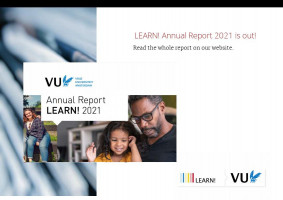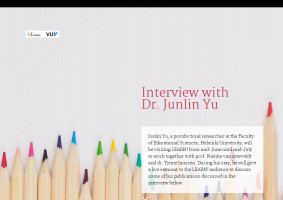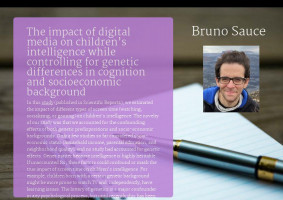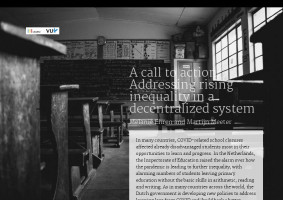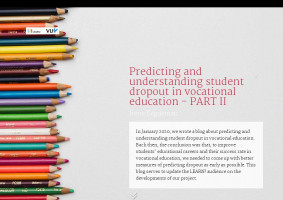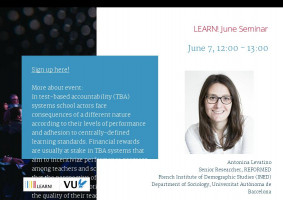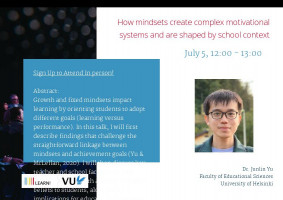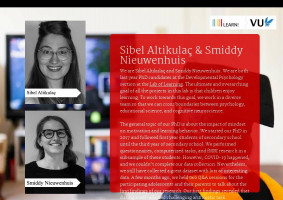Junlin Yu, a postdoctoral researcher at the Faculty of Educational Sciences, Helsinki University, will be visiting LEARN! from mid-June until mid-July to work together with prof. Nienke van Atteveldt and dr. Tieme Janssen. During his stay, he will give a live seminar to the LEARN! audience to discuss some of his publications discussed in the interview below.
(2)(1)_w400_h420_1.jpg)
Before your current position at the University of Helsinki, you completed your PhD and MPhil AT the universiy of Cambridge. Could you tell us about your work there?
I am intrigued by the phenomenon that boys lag behind girls academically in many countries. Obviously, girls’ underachievement is still an important issue in the global south, but in the more developed countries, we see that boys are underachieving in schools. My PhD research focused on how gendered motivational patterns contributed to gender gaps in school engagement and achievement.
My PhD research uncovers two motivational pathways in boys’ underachievement. The first - an academic pathway - concerns that boys are more often found in fixed mindset motivational patterns. They tend to see their ability as innate, view effort as pointless, and disengage from school. The second - a social pathway - concerns boys’ greater preoccupation with their social image. Academic effort is considered uncool and, as a result, leads boys to withdraw effort from school. Both of these pathways contribute to boys’ disengagement and underperformance in school. However, these results mask a complex picture: in reality, not all boys underperform, and not all girls do well in school.
In a third study, I identified the specific groups of girls and boys who underperformed in school. To do this, I used latent profile analysis to investigate how students acted out their gender roles in school. The results show that problematic academic mindsets and social goals that we discussed earlier did not apply to two thirds of the boys who had more flexible ideas about gender. At the same time, signs of low engagement and achievement were apparent in a sizable group of girls who conformed to the traditional gender norms. By identifying the specific groups of girls and boys who fall behind, this study challenges the simplistic, binary view of the gender gap in schools.
At your current post-doctoral position, you are studying how students' growth motivation (growth mindset, mastery goal) impacts learning. How does the growth mindset vs a fixed mindset affect student learning?
Like many other motivation researchers, I am interested in studying motivation as an independent variable, that is, how it influences students’ engagement and learning. However, I also study motivation as a dependent variable–an important educational outcome in and of itself. In my current research, I am looking at how environmental influences such as the school contex and teacher practices can influence students’ motivation to improve, including growth mindset.
Carol Dweck proposes that people can think about their intelligence or ability in two ways. Some people view their ability as largely fixed, whereas other people view their ability as malleable. This is based on her earlier work on attribution theory where personal attributes are either fixed and uncontrollable or malleable and controllable. A large body of work has found that students with a stronger growth mindset tend to be more resilient. They bounce back from failure more quickly, are more engaged and persist in the face of difficulty. As a result of such adaptive motivational patterns they also perform better in school compared to those with a fixed mindset.
My recently published study looks at the association of students’ growth mindset with teacher beliefs, teaching practices and the broader school climate. In this study, I used the Finnish data from the OECD Study on Social and Emotional Skills. I selected the elementary school students sample because they are taught by one teacher for different subjects so it is easier to tease out the influence of teacher beliefs and teaching practices compared to secondary school students who have different subject teachers.
What I found is that students reported a stronger growth mindset when their teachers used more guided inquiry practices. Guided inquiry represents a middle ground between traditional teacher-directed instruction and student-led discovery learning. Students have the autonomy to explore and discuss their own ideas but, at the same time, teachers provide a lot of scaffolding and guidance to the students. The result suggests that when students make progress autonomously, they may experience a sense of effectiveness and believe that ability can be improved.
I also found that students reported a stronger fixed mindset when teachers differentiated tasks based on studuents’ abilities. This is interesting because we often talk about differentiation and individualized learning at school. It appears that there are nuanced differences between effective and ineffective differentiation practices. When teachers engage in ineffective, unsophisticated task differentiation practices, they may unwittingly communicate their expectations that certain students are more able than others.
At the school level, an emphasis on the value of social-emotional development was linked to a stronger growth mindset among students. This is interesting because as students progress from primary to secondary education, there is an increasing emphasis on their academic performance and a decreasing emphasis on their social-emotional needs.
I also looked at within-class ability grouping and school-wide ability tracking and how they might influence students’ mindset. However, I did not find significant effects. It seems that ability grouping and teacher practices are intertwined: for example, when teachers teach an ability-grouped class, they tend to use more direct instruction. It becomes difficult to disentangle the effects of the grouping from instructional style. I touch upon these ideas briefly in the paper concluding that grouping, as an organizational tool, might not be directly linked to student mindset but potentially affects teacher expectations and practices.
In the next step, I plan to conduct cross-national comparisons to better understand which classroom and school factors are consistently linked to growth mindset across cultures and which are more culturally specific factors.
In the LEARN! seminar on July 5th, I will also be discussing one study which shows that students' mindsets can create complex motivational systems that influence students’ learning. Based on existing research, one might assume a straightforward relationship between students’ mindsets and goals: students with fixed mindsets pursue performance goals, and students with growth mindsets pursue mastery or learning goals. Instead, I found that students form complex motivational profiles: students with the same mindset may enact it differently through their goals. I found a group of growth mindset students who simultaneously pursue high mastery goals and high performance goals. Thus it seems like growth mindset students are more able to coordinate mastery and performance goals at the same time and do as well as and sometimes even better than purely growth oriented students in school. In addition, I have identified a group of fixed mindset students who have low levels of performance goals and disengage from their education. A recent study by a PhD student in prof. Nienke van Atteveldt’s lab has replicated these mindset profiles in a Dutch sample, which is quite encouraging.
WHAT WILL YOUR WORK FOCUS ON DURING YOUR STAY AT LEARN?
I will be working with prof. Nienke van Atteveldt and dr. Tieme Janssen. As part of their research, they have conducted a growth mindset intervention which improved student achievement. Since my interest is in how the learning environment may influence student mindset, I will be working with them to look at the contextual moderators of growth mindset intervention. Sometimes even if we deliver a growth mindset intervention, students may encounter very different messages in their broader school environment and daily interactions with school teachers. One of my hypotheses is that students who receive the growth mindset intervention are more likely to perform better when they also have a supportive classroom environment compared to others.I will be working with existing data and looking at for whom and under what conditions the growth mindset intervention works.
WHY THIS INSTITUTE FOR THE VISITING STAY?
It is all about shared research interests. I have met both Nienke and Tieme previously at conferences and know that we have similar interests. I have never worked with randomized control trials before but I have expertise in classroom-based research. So I believe this would be complementary and a great opportunity to collaborate.I am hoping to learn from their extensive research programmes on students’ growth mindset. I also hope that this experience will help me develop a network, independent of my current PI’s network. I look forward to meeting other researchers who are doing interesting work at the LEARN! Institute.




